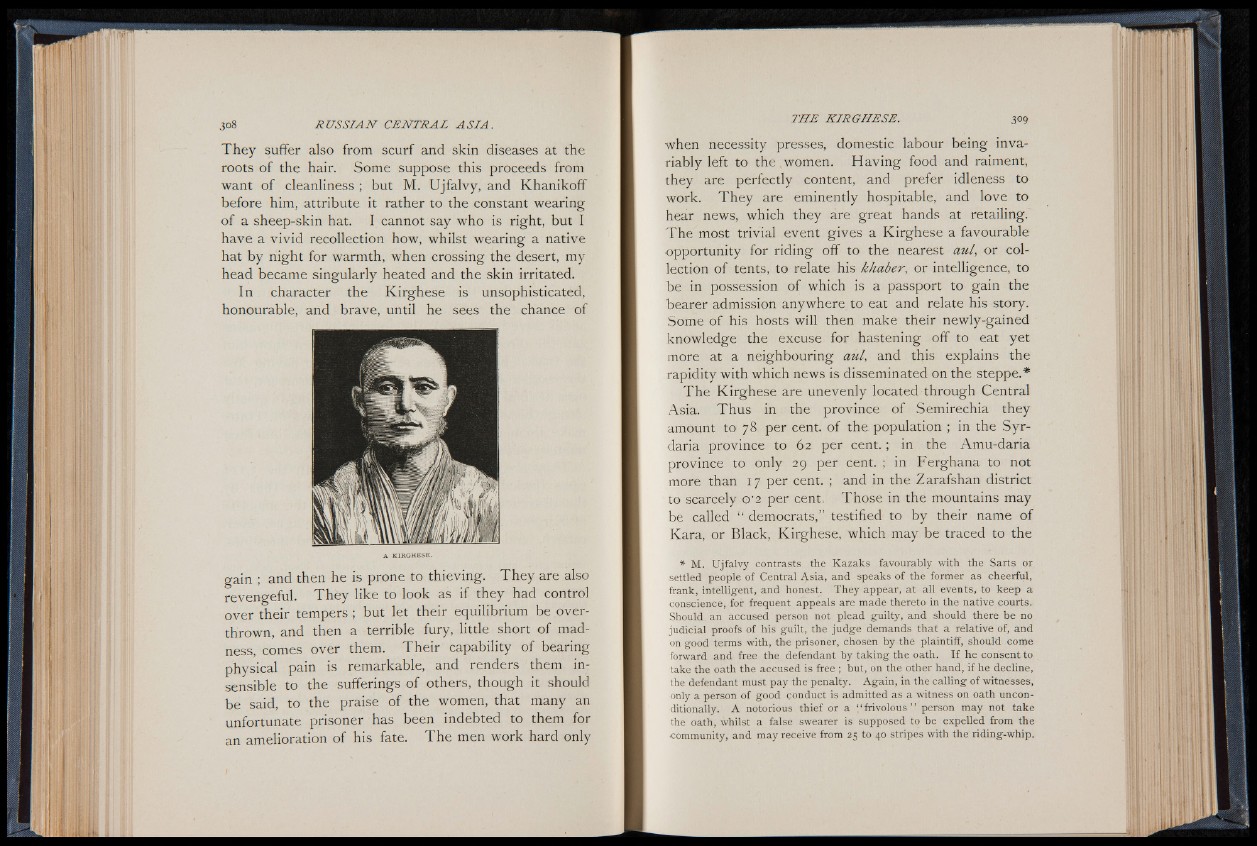
They suffer also from scurf and skin diseases at the
roots of the hair. Some suppose this proceeds from
want of cleanliness ; but M. Ujfalvy, and Khanikoff
before him, attribute it rather to the constant wearing
of a sheep-skin hat. I cannot say who is right, but I
have a vivid recollection how, whilst wearing a native
hat by night for warmth, when crossing the desert, my
head became singularly heated and the skin irritated.
In character the Kirghese is unsophisticated,
honourable, and brave, until he sees the chance of
A KIRGHESE.
gain ; and then he is prone to thieving. They are also
revengeful. They like to look as if they had control
over their tempers ; but let their equilibrium be overthrown,
and then a terrible fury, little short of madness,
comes over them. Their capability of bearing
physical pain is remarkable, and renders them insensible
to the sufferings of others, though it should
be said, to the praise of the women, that many an
unfortunate prisoner has been indebted to them for
an amelioration of his fate. The men work hard only
when necessity presses, domestic labour being invariably
left to the,women. Having food and raiment,
they are perfectly content, and prefer idleness to
work. They are eminently hospitable, and love to
hear news, which they are great hands at retailing.
The most trivial event gives a Kirghese a favourable
opportunity for riding off to the nearest aul, or collection
of tents, to relate his khaber, or intelligence, to
be in possession of which is a passport to gain the
bearer admission anywhere to eat and relate his story.
Some of his hosts will then make their newly-gained
knowledge the excuse for hastening off to eat yet
more at a neighbouring aul, and this explains the
rapidity with which news is disseminated on the steppe.*
The Kirghese are unevenly located through Central
Asia. Thus in the province of Semirechia they
amount to 78 per cent, of the population ; in the Syr-
daria province to 62 per cent.; in the Amu-daria
province to only 29 per cent. ; in Ferghana to not
more than 17 per cent. ; and in the Zarafshan district
to scarcely o'2 per cent, Those in the mountains may
be called “ democrats,” testified to by their name of
Kara, or Black, Kirghese, which may be traced to the
* M. Ujfalvy contrasts the Kazaks favourably with the Sarts or
settled people of Central Asia, and speaks of the former as cheerful,
frank, intelligent, and honest. They appear, at all events, to keep a
conscience, for frequent appeals are made thereto in the native courts.
Should an accused person not plead guilty, and should there be no
judicial proofs of his guilt, the judge demands that a relative of, and
on good terms with, the prisoner, chosen by the plaintiff, should come
forward and free the defendant by taking the oath. I f he consent to
take the oath the accused is free ; but, on the other hand, if he decline,
the defendant must pay the penalty. Again, in the calling of witnesses,
only a person of good conduct is admitted as a witness on oath unconditionally.
A notorious thief or a “ frivolous” person may not take
the oath, whilst a false swearer is supposed to be expelled from the
community, and may receive from 25 to 40 stripes with the riding-whip.